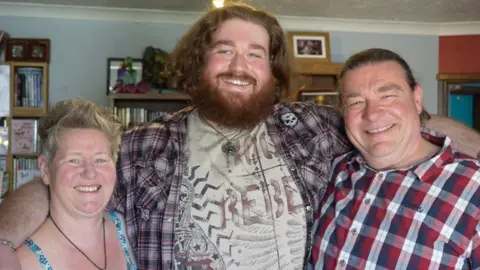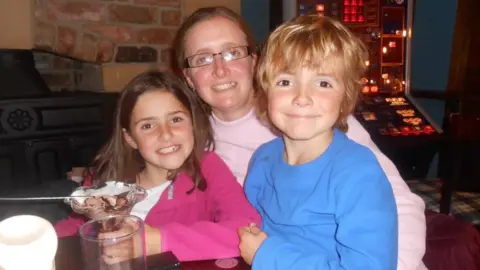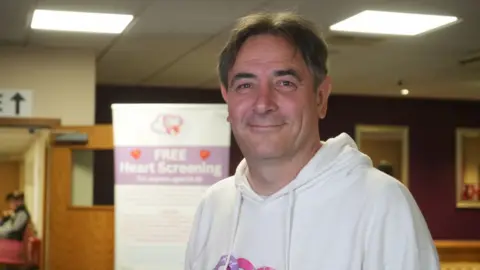Heart screening at 16 'gave me bonus years'
 Jamie Niblock/BBC
Jamie Niblock/BBCHarry thought it was normal to hear his heartbeat permanently racing in his ears - it was all he had known since he was a child.
His parents, though, were worried that his heart was beating too fast - but doctors said it was related to Harry's other medical conditions and was nothing to worry about.
But an invitation to a charity screening when he was 16 led to the discovery of a defect in Harry's heart which required surgery. Doctors told Harry when he woke up that without the operation, he could have died.
"These are like bonus years, as far as I'm concerned - I'm so, so lucky," said Harry.
'A tonne of bricks'
Harry's heart had two accessory pathways - an abnormal electrical connection bypassing the normal route, which causes electrical signals to travel more quickly than usual.
The now 22-year-old from Leigh-on-Sea said hearing how close he had come to death "hit me like a tonne of bricks".
"When you're that young, you don't understand your own mortality, you don't think about it at all really," he told the BBC.
"It's not one of those things that you want to do - talk to an 18-year-old boy and ask him what songs you want for a funeral, just in case," his father Gary said.
"Karl and the Carli Lansley Foundation have saved his life, and saved our family."
 Karl Lansley
Karl LansleyHarry's condition was picked up at the second screening organised by the Carli Lansley Foundation in 2019.
The events offer free heart screenings to people aged 14 to 35 in the Southend area, to detect previously undiagnosed heart conditions.
About 2,500 people have now been screened by the charity, with potential heart problems detected in 120 of them.
"In most cases, these were conditions they never knew they had," Karl Lansley, founder of the charity, told the BBC.
 Jamie Niblock/BBC
Jamie Niblock/BBCThe foundation was set up in memory of Carli Lansley, who died in the middle of the night in 2017 from sudden arrhythmic death syndrome [SADS], aged just 36.
Her widower Karl said there was a growing awareness of SADS due to footballers such as Christian Eriksen, Tom Lockyer and Fabrice Muamba suffering heart attacks on the pitch in recent years.
The charity has now fundraised and hosted nearly 30 free screening events, administered and run by Cardiac Risk in the Young. At the event, which was attended by the BBC in April, 106 people were screened, five of whom were referred for further investigations.
"When we as a charity find out these results, it makes everything we do completely worthwhile," said Mr Lansley, who last year walked 1,000 miles to raise money for the foundation.
The screenings for 2025 are fully booked, although dates for 2026 have been announced, alongside defibrillator and CPR training.
What is SADS?
SADS is when someone dies suddenly and unexpectedly from a cardiac arrest, but the cause of the cardiac arrest cannot be found.
About 500 people in the UK are affected by SADS every year.
It mainly affects young people aged 14 to 35.
A government spokesperson told the BBC that the screening policy should be "based on scientific evidence", and that "the UK National Screening Committee's last review into sudden cardiac death found that current tests are not accurate enough to use on young people with no symptoms".
"The UK National Screening Committee has received a proposal to consider cardiac screening in young athletes aged 14-35 and is investigating further," a spokesperson for the Department of Health and Social Care added.
Follow Essex news on BBC Sounds, Facebook, Instagram and X.
